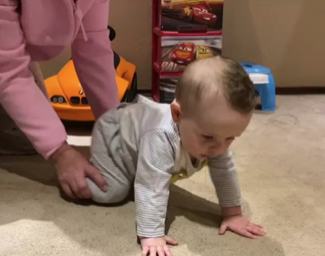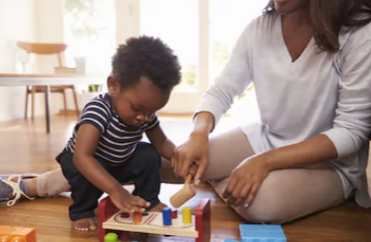If you are a parent or are around parents of young children, there is a high chance that you’ve heard about developmental milestones. You may have even read about it in a baby book or an article, heard from your paediatrician or from any other professional specialising in early childhood development. You may have heard parents proudly speak about the fact that their child has skipped certain milestones, such as crawling and has gone straight to walking, and so they’re now “ahead of the pack”. You may have seen the complete opposite, parents in a frenzy because their child is one month behind in some of their milestones. You may have heard others completely disregard milestones all together. So what is the fuss all about? How important are milestones really?
Milestones are the skills a child is expected to learn and be able to do by a certain age, similar to a checklist. Children don’t only grow and develop in size; milestones are included in all areas of your child’s development:
- Physical development – This includes mastering the big and small muscles for movement, balance, coordination; e.g. needed for walking or holding a pencil and writing. It is also commonly known as gross and fine motor skills.
- Social and emotional development – This is the child’s ability to form and maintain relationships. Relationships are needed to learn what is acceptable in social environments and what is not such as learning to take turns, fairness and cooperation. This in turn assists children with developing their self-esteem, control of their emotions and confidence.
- Cognitive development – This refers to the ability to learn and think in more complex ways which promotes the learning and understanding of different concepts. These concepts include recognizing colours, shapes, numbers and letters. As their cognition develops, children begin to ask more and more questions, especially the famous “Why?” which assists in their ability to problem solve and focus on specific tasks or objects, increasing their attention.
- Communicative development – Is the ability to understand language and communicate thoughts, emotions and needs verbally. As children develop they begin to participate more actively in conversations and look forward to telling and listening to stories.
- Adaptive skills – This is the child’s ability to adapt to the surrounding environment and everyday routines. Some examples of adaptive skills include a child learning to feed themselves with a spoon, dress themselves, go to the toilet independently, brush their teeth and clean up after themselves.
The milestones of these various areas are expected to be reached in the same sequence for every child, for example in physical development, a child is expected to develop from rolling first, to sitting, to crawling, to standing and then to walking. Each skill is an important building block for the next skill, and it affects skills needed later on in life, including their learning ability in the classroom. This is not to say that if your child skips a milestone they will struggle with learning and other life tasks, some kids turn out perfectly fine. However, there has been extensive research that shows children being underdeveloped in certain skills, due to them skipping their milestones when they were younger. An example of this is crawling; there are numerous benefits for a baby to crawl before walking. Crawling encourages the development of:

Learning to crawl
This is an example of how just one milestone can affect so many different areas of your baby’s development, now think about all the other milestones your baby is expected to reach and the impact they have on skills and tasks carried out later on in life!
It must be noted that not all children develop at the exact same time and it is normal for children to reach milestones earlier or later than their peers. It does not mean your child is “ahead” or “behind”, they’re developing at their own unique pace. However, if you are concerned, it is advisable to visit your doctor to discuss your child’s development. Milestones can be a key indicator for your doctor if there is a problem. It assists the doctor making a diagnosis to ensure early intervention because some diagnoses have specific milestone areas that have poor development e.g. Children with autism spectrum disorder are often delayed in communication, social and emotional skills.
So how do we encourage the development of milestones? PLAY! Through play children develop social relationships, keep the body and mind healthy, and learn about themselves and the world around them. Children get to explore, experiment and learn in their own time and space through play, they learn how objects work, give meaning and value to items in a world they create, they set goals and learn how to problem solve through active experiences. Play essentially allows for learning in all areas of development, and depending on the age and stage of development of your child, their stage of play will differ. Infants participate in sensorimotor and explorative play, which allows them to learn how to use their bodies as well as to learn the effect of their actions on objects and the environment around them. Toddlers participate in symbolic and simple constructive play, this focuses on functional play (representing real life with objects), simple pretend play, and simple construction e.g. build a tower. Pre-schoolers participate in dramatic, complex constructive, and pregame play which includes dramatic role play and constructive play e.g. arts and craft, Lego. School going children participate in games with rules, and develop an interest in sports or formal groups. It is important that children participate in age appropriate play, as this ensures the “Just Right Challenge”. By having the just right challenge, activities are not too easy that the child gets bored or doesn’t learn anything but it’s not too difficult either, which would result in the child getting frustrated and giving up, affecting his/her self-esteem. It is the perfect balance ensuring that your child learns and develops through play.

Now after this information overload you may be wondering where to start, what to do with your child… SkidZ Clever Activity Box is the perfect solution. Each box comes with over 100 age appropriate activities as well as the equipment for each activity.
It includes a simple, easy to use manual that tells you exactly which milestones you’ll be working on and provides the opportunity for you to play with your child, build a loving, healthy relationship and have fun. Each activity has easy to follow instructions, with minimal preparation, ideal for both parents and nannies to use. The program has been developed by 4 experts in early childhood development. The boxes are divided into the following ages 0-6 months, 6-12 months, 12-18 months, 18-24 months and 2-5 years so that you only need to buy the appropriate one at a time, no subscription! More info on this wonderful product can be found on the website http://skidz.co.za. All orders are also placed from the online shop on the website. For some up to date news, articles and specials follow SKidz on Facebook at www.facebook.com/skidzsa. Remember to have fun too while playing with you child.
Written by Skidz Occupational Therapist Kiara Lubbers
- Developmental Milestones…What’s the fuss? - November 25, 2019
- What should my toddler be doing during the day? - August 16, 2019
- The importance of age appropriate stimulation - July 15, 2019





